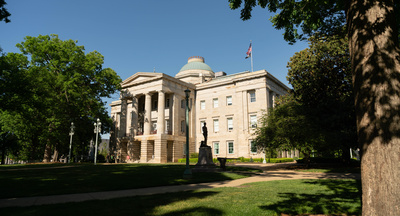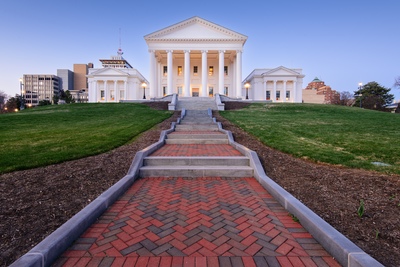
State Government Affairs, Elections & Campaigns
How Lieutenant Governors Are Selected (And Why It Matters)
December 10, 2025 | Bill Kramer
May 27, 2021 | Bill Kramer
-f58aee-1200px.jpeg)
Key Takeaways:
The COVID-19 pandemic coincided with a major election in 2020, which left states scrambling to amend voting laws — particularly around absentee/mailed ballots — to allow electors to cast their ballots safely. Balancing access to the ballot with security concerns is a major issue for state policymakers before the 2022 elections. This is the first installment of a three-part series covering current election laws and recent legislation to amend these laws. It should be paired with MultiState's State Voting and Election Laws Landing Page and Dashboard, where we’ll be keeping track of this vital issue moving forward.
The first questions we’ll tackle while examining voting and election laws in the states are: Who is eligible to vote? And how can eligible voters register for upcoming elections? So far, state lawmakers have introduced over 450 bills addressing voter registration and another 150 bills on voting rights for people convicted of a crime.
All states provide voters an opportunity to register to vote when they apply for a driver's license through the National Voter Registration Act of 1993 (or "motor voter" law). Some states have taken this tool to register voters even further by establishing an automatic voter registration system that automatically registers eligible residents to vote when they interact with certain state agencies, such as the Department of Motor Vehicles (DMV) or state equivalent. The key difference is that an automatic voter registration system is an opt-out program while the traditional motor voter option is an opt-in system. An eligible voter in an automatic voter registration state will be notified that they'll be automatically registered to vote in the state and will need to actively opt-out in order to avoid registration.

Last year, New York lawmakers enacted the New York Automatic Voter Registration Act of 2020 (SB 8806), which requires designated state agencies to establish an automatic voter registration system. The new law designates the DMV and other state agencies that interact directly with New York residents to work with the State Board of Elections to integrate agency and voter registration applications. This new, single application will serve as both an application for services and a voter registration application. The DMV will come online in 2023, followed by the Department of Health, Department of Labor, and the Office of Temporary and Disability Assistance in 2024. The State University of New York will be added in 2025.
This year, Delaware lawmakers passed legislation (SB 5) to create an automatic voter registration system at the state DMV and grant the State Election Commissioner the authority to implement automatic voter registration at other state agencies that already offer voter registration services under existing law. The bill passed in early May 2021 and is now awaiting a signature from the governor before it becomes enacted. Once enacted and put into effect, Delaware would become the nineteenth state to implement an automatic voter registration system.
Eligible voters must register before voting in their state (except North Dakota, which does not require voters to register). Currently, 24 states allow voters to register on the same day that they cast a ballot (primarily on election day and any designated early voting days). But even then there are exceptions: Alaska and Rhode Island only allow election day registration to vote for the U.S. President and Vice President. North Carolina allows voters to register on the same day during the early voting period but not on election day. For the remaining states, election offices must receive your registration by a certain deadline ranging from 30 to 15 days before the election.

Before this year, Montana had offered election day voter registration. But lawmakers enacted a bill (SB 176) this session that removes the option to register on election day, and instead allows late voter registration until noon the day before election day at county election offices. Voters will no longer be able to register on election day. Otherwise, voter registration must be postmarked or submitted online no later than 30 days before the election.
This year, Iowa lawmakers enacted legislation (SF 413) that shortens the voter registration period by moving the registration deadline from 10 days before a general election to 15 days before the election. However, Iowa still offers election day voter registration. If a person fails to register to vote during the registration period, they may still register on election day by appearing in person at the polling place for the precinct in which the individual resides and completing a voter registration application, making a written oath, and providing proof of identity and residence.
Most states deny the right to vote for people convicted of felonies. However, there's usually a route to restore voting rights for those convicted of a felony. A majority of states restore the right to vote to those convicted of a felony once the full sentence has been served, which generally includes prison time, parole, probation (some states also require the payment of all restitution, fees, and fines). Another 20 states restore voting rights once prison time is served. Vermont, Maine, and D.C., never disenfranchise people convicted of a felony and even allow them to vote while incarcerated. The remaining states impose rules that depend on the type of crime a person committed.

Florida has garnered the most headlines in regards to felony conviction disenfranchisement recently. In 2018, Florida voters approved Amendment 4 to automatically restore the right to vote for people with prior felony convictions, except those convicted of murder or a felony sexual offense, upon completion of their sentences, including prison, parole, and probation. However, lawmakers enacted a law in 2019 to require people convicted of a felony to complete "all terms of sentence" including full payment of restitution, or any fines, fees, or costs resulting from the conviction, before they could regain the right to vote. This law was upheld by a federal appeals court in 2020 and has caused much confusion regarding the rights of people convicted of felonies to register to vote in the state.
Governors have also taken independent action in several states to restore voting rights to people convicted of a felony. In 2018, Governor Cuomo signed an executive order restoring the right to vote immediately following release for most New Yorkers who are on parole after incarceration for a felony. This means that the governor’s office reviews the information of each person released to community supervision in New York and then issues a partial executive pardon that restores each approved person’s ability to register and vote. In late 2019, Kentucky Governor Andy Beshear issued a blanket pardon to over 140,000 residents who have completed sentences for nonviolent felonies. Similarly, Iowa Governor Kim Reynolds signed an executive order in 2020 to restore the right to vote to people convicted of a felony (except homicide) upon completion of prison time.
This year, New York lawmakers enacted legislation (SB 830) to restore the voting rights of people on parole. This would codify much of Governor Cuomo’s 2018 executive order. And lawmakers in Washington enacted a law (HB 1078) this session (effective January 1, 2022) that will restore the right to vote for individuals convicted of felonies automatically upon their release from incarceration. Previously, people convicted of a felony in Washington had to wait until parole and probation periods had ended. Washington will become the twenty-first state to restore the right to vote for people convicted of a felony once they are released from prison.
Next week’s installment of MultiState’s election laws blog post series will cover legislation around absentee/mailed ballots. In the meantime, check out MultiState's State Voting and Election Laws Landing Page and Dashboard, where we’ll be keeping track of this vital issue moving forward.

December 10, 2025 | Bill Kramer
-238a17-400px.jpg)
December 10, 2025 | Bill Kramer

November 5, 2025 | Bill Kramer